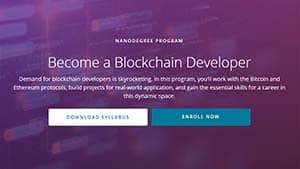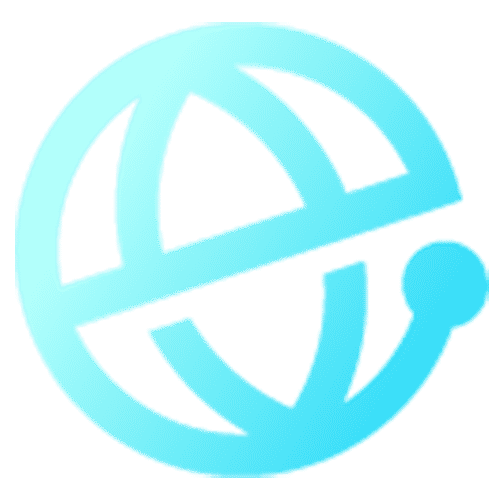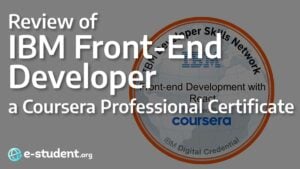If you are looking to become a blockchain engineer or certified blockchain professional, there are many online courses that can take you there. That is why in this post, we’ll review the 10 best-rated online blockchain courses for 2021. These online courses will give you the skills, tools, and knowledge needed to succeed in blockchain development.
For many reasons, there’s no better time than now to become a blockchain developer:
- The average salary of a blockchain developer in the United States is $154,550 per year, and the top earners can even earn an average of $231,500 per year.
- Experts predict that the blockchain market will grow by 82.4% per year from 2021 to 2028, becoming a $394 billion industry by 2028.
- According to LinkedIn research, blockchain is the #1 most in-demand hard skill in the United States, United Kingdom, France, Germany, and Australia.
Now that we know the “why”, let’s jump right into the “how”.
Here are our reviews of the top 10 best online blockchain courses for 2022.
Best Blockchain Courses
Best Overall: Blockchain Developer Nanodegree (Udacity)

- Extensive coverage of using Solidity for Ethereum smart contracts
- Learn to develop decentralized apps
- Teaches all the fundamentals of blockchain technology
- Get hands-on experience with real-world projects
- Teaches blockchain development on both Ethereum and Bitcoin
Cons
- Time-intensive program
Udacity’s “Blockchain Developer Nanodegree” is the best blockchain course for most new blockchain developers. Unlike other classes, the syllabus here dives straight into developing your very own private blockchains, decentralized apps (Dapps), minting tokens, and using smart contracts to guide innovation. While basic knowledge of programming is expected from applicants, Udacity also offers the “Introduction to Programming” Nanodegree for students who want to get up to speed in an efficient manner.
There’s no better online class to teach you how to use Ethereum smart contracts and non-fungible tokens (NFTs) to maximum efficiency. With Ethereum being the blockchain of choice of banks such as J.P. Morgan and the European Investment Bank, you’d be wise to learn the ins and outs of its specifics.
As for the hands-on projects, in this online class, students are guided through the following projects:
- Creating your own blockchain which is cryptographically secure and immutable (using Node.js and Leveldb).
- Building a Dapp with a new and unique Ethereum-based token of value that can be sold and transferred like any other cryptocurrency.
- Building a Dapp that uses Ethereum smart contracts for supply chain management and item tracking.
- Building a decentralized finance (DeFi) Dapp that uses smart contracts to handle automatic payments based on flight delay insurance (using Solidity).
At the end of this online blockchain course, you’ll complete a capstone project. All the skills you’ve acquired throughout the syllabus are put into practice, as you’ll be minting your very own tokens and listing them for sale on a blockchain marketplace. The capstone project also serves as a great way to show prospective employers what you’re capable of. After all, nothing beats an effective portfolio.
In a nutshell: this Blockchain class will teach you everything needed to start working with decentralized applications. The syllabus isn’t cheap and is rather intense, but you get what you pay for: a thorough understanding of blockchain technology from experts. These are why we ranked Udacity’s “Blockchain Developer Nanodegree” as #1 in this review of the top-rated blockchain classes.
Best Academic Course: Blockchain Specialization (Coursera x SUNY)
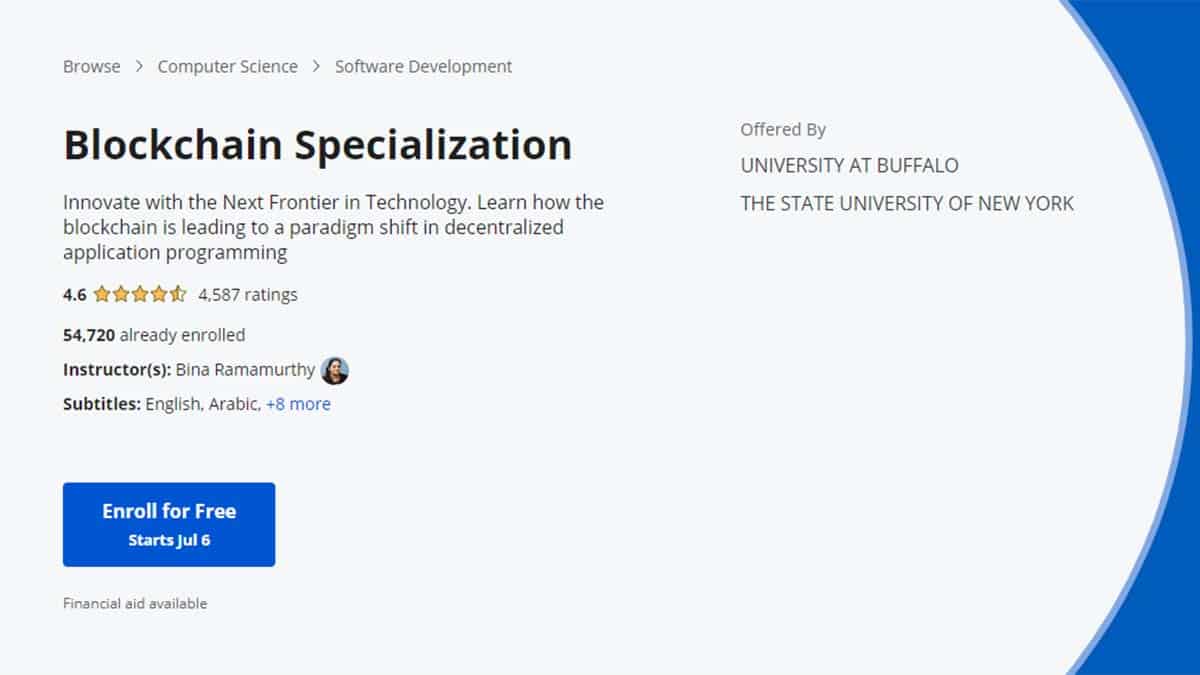
40% ($140 USD) off your first year of Coursera Plus Annual (expires 2 December 2024)
- Beginner-friendly curriculum
- Syllabus developed by prominent university
- Filled with practical programming assignments
Cons
- Some of the content is outdated
Coursera’s “Blockchain Specialization“, a joint effort of the University at Buffalo and The State University of New York, teaches students how to develop applications on the Ethereum and Bitcoin blockchains. While some of the lessons could use revisits and revisions, the syllabus is still one of the most applicable and well-structured out of all the blockchain classes we reviewed.
The syllabus takes four months to get through and is split into the following four courses:
Blockchain Basics. This course offers a comprehensive introduction to blockchain technology. From the basics of blocks, transactions, and chains to the fundamental differences between hard forks and soft forks, this course provides knowledge on all the fundamentals of blockchain technology.
Decentralized Applications (Dapps). Decentralized Applications (Dapps) is the second course in Coursera’s blockchain specialization. In this class, students are given a bird’s eye view of decentralized applications and the different components and processes that make them up. including Solidity programming and deploying smart contracts.
Smart Contracts. Smart contracts, the topic of the third course, are computer programs stored on the blockchain that can interact with other smart contracts and with end-users. A user can invoke a smart contract, which runs like an application and automatically carries out transactions recorded in the blockchain.
Blockchain platforms. In this course, students will learn about various blockchain platforms, architectures, and applications such as Bitcoin, Ethereum, Hyperledger, Augur, and Grid+.
All in all, Coursera’s “Blockchain Specialization” continues to be a superb online blockchain course in 2022 and we highly recommend it to students interested in blockchain development.
Best for Beginners: Blockchain A-Z: Learn How to Build Your First Blockchain (Udemy)
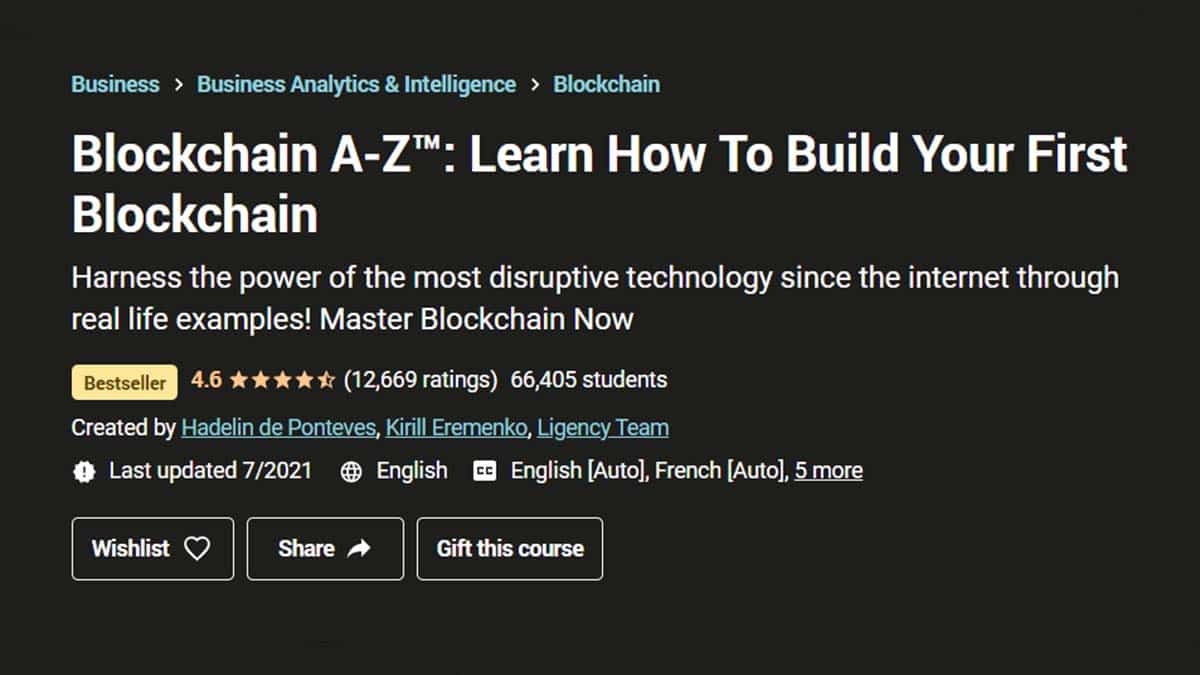
New customer offer! Top courses from $14.99 when you first visit Udemy (expires 31 March 2024).
- Short and content-packed syllabus
- Extensive coverage of blockchain theory
- Very little prerequisite knowledge required
Cons
- Could use more hands-on projects
Udemy’s “Blockchain A-Z: Learn How to Build Your First Blockchain” is a good choice for those students who are new to blockchain development and want a complete overview of the best practices to get started.
While a basic understanding of Python programming and mathematics is required for this course, the syllabus still manages to stay accessible to beginners. If you feel like you need to brush up on your knowledge of Python, consider taking one of our top-rated online Python courses instead.
As for the syllabus, it’s split into these three modules:
- Module 1 covers building blockchains and exploring the different blockchain technologies available on the market.
- Module 2 covers creating your own cryptocurrencies with the basic functionality you’d expect from any cryptocurrency.
- Module 3 is the final module of the class and it goes deeper into the theory and practice of smart contracts.
All in all, this blockchain class serves as a helpful and informative introduction to various blockchain concepts, and that is why we felt it was more than deserving of a spot in the top 3 in this review of online blockchain courses.
Blockchain – Principles and Practices (Pluralsight)

- Content is well-organized and easy to follow
- Well-articulated and engaging instructor
- Extensive coverage of blockchain use cases and proof of work
Cons
- Focuses only on proof of work algorithms
Pluralsight’s “Blockchain – Principles and Practices” online course provides a comprehensive overview of the best practices that you’ll need when developing blockchain applications. The best part of this course is the well-organized curriculum. Each lesson builds on previous lessons, and it’s easy to follow along with the instructor.
But, we would have liked to see more of a balance between the proof of work and proof of stake cryptographic systems. After all, as of right now, the syllabus only focuses on proof of work algorithms, which are decreasing in popularity due to high energy consumption and weak security.
All in all, though, “Blockchain – Principles and Practices” on Pluralsight is a good choice for students who are new to blockchain development because it’s easy to follow along with the instructor. However, if you’re looking for more balanced coverage of both proof of work and proof of stake systems, then we recommend checking out one of our other best online blockchain courses.
Blockchain: Foundations and Use Cases (Coursera x ConsenSys Academy)
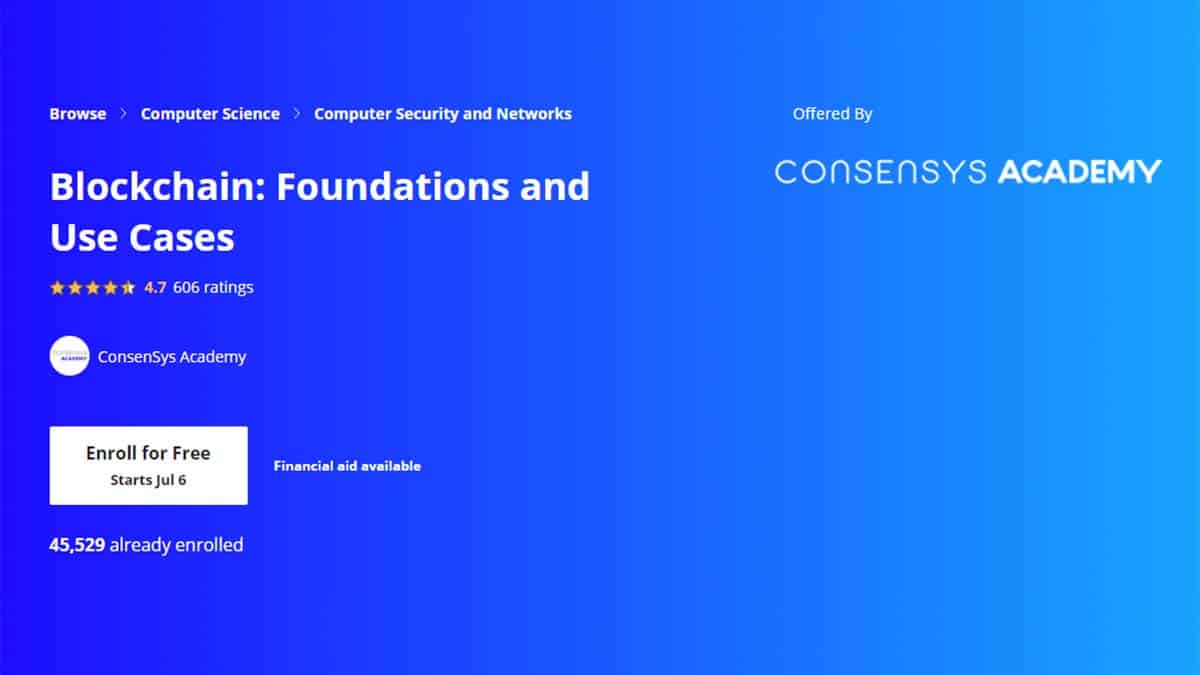
40% ($140 USD) off your first year of Coursera Plus Annual (expires 2 December 2024)
- Covers both Bitcoin and Ethereum
- Good coverage of both proof of work and proof of stake algorithms
- Covers many topics within a short timeframe
Cons
- Too much self-promotion inside the lessons
Coursera’s “Blockchain: Foundations and Use Cases” is another good course for those who want to learn best practices and understand the theory behind blockchain.
The syllabus of this course consists of five modules, with topics such as cryptography, hashes, key encryption, digital signatures/verification primitives such as zero-knowledge proofs and ring signature schemes, key distribution schemes (asymmetric vs symmetric), mining basics, consensus mechanisms, together with transaction validation methods and smart contracts.
However, one disadvantage of this course is that it contains a significant amount of self-promotion from ConsenSys (the developers of this course). While the ConsenSys team is good at teaching blockchain concepts, many students who have reviewed this course have brought attention to the high amounts of self-promotion included in the lessons.
All in all, though, Coursera’s “Blockchain: Foundations and Use Cases” is a good choice for those who are new to blockchain development because it covers a good range of topics within a relatively short syllabus.
Blockchain Technologies Course (MIT Sloan)
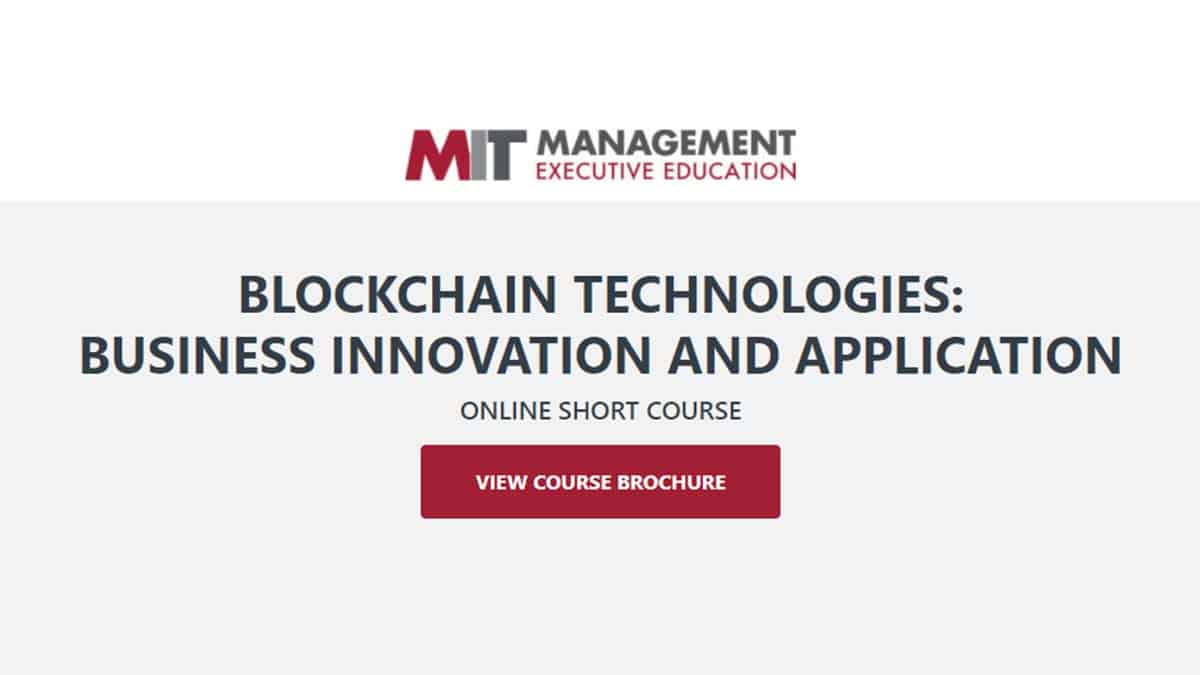
- Provides an opportunity to get blockchain certified from MIT
- Syllabus covers a unique set of blockchain topics
Cons
- Expensive
- Some of the content is outdated as of 2022
MIT Sloan’s “Blockchain Technologies Course” is an online blockchain course that covers the basics of blockchain technology, with a focus on blockchain business networks and other enterprise applications of blockchain technology.
This course is designed for those who are new to blockchain and want to learn the basics from the experts at MIT: the world’s #1 rated university.
The course syllabus is split into six modules and these modules cover what blockchain is, how it works, the best practices, the basics of Bitcoin and how it solves the double-spending problem, best-known consensus mechanisms, and many more topics.
This online course provides a unique set of lessons that are not covered by many of the other courses on this list, which is why we felt it was easily deserving of a spot amongst the best blockchain courses. But, due to its’ rather expensive price tag, it’s not an excellent pick for most students.
BerkeleyX's Blockchain Fundamentals Professional Certificate (edX x Berkeley)
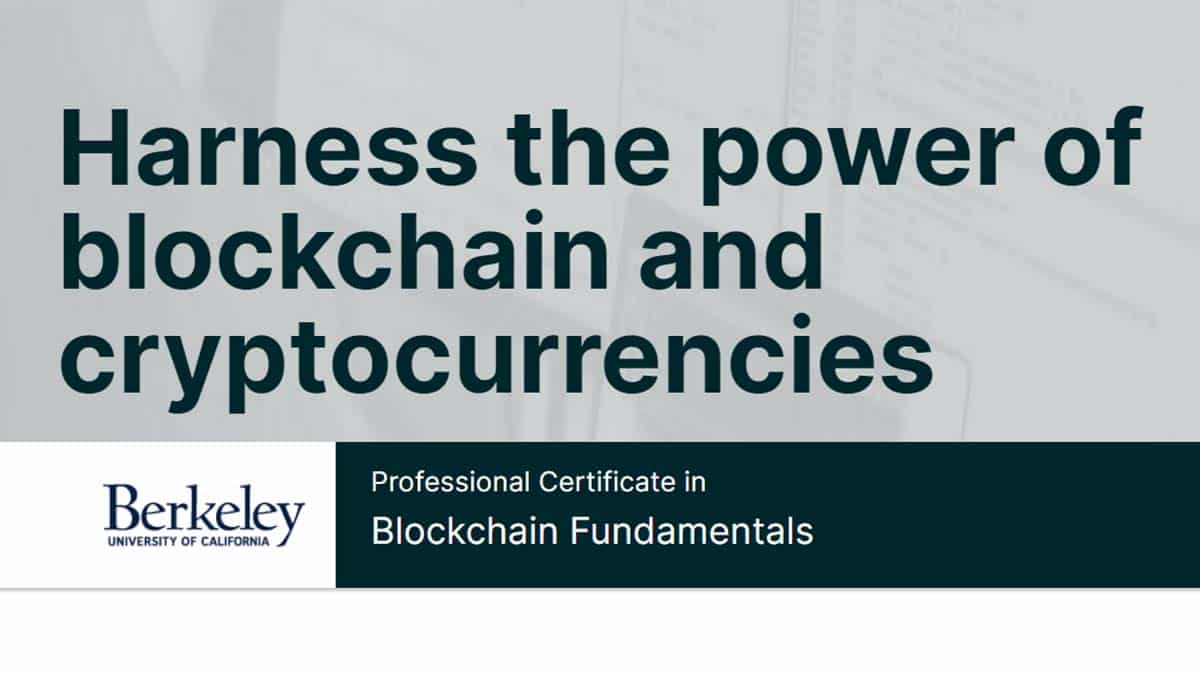
- Students can enroll for free
- Earn a blockchain certificate from Berkeley upon graduation
Cons
- Issuing a certificate requires payment
- Content could use updating
Offer on the edX online learning platform, BerkeleyX’s “Blockchain Fundamentals Professional Certificate” provides students with a variety of best practices and best-known blockchain concepts. As is typical of edX, the price tag is reasonable, and the content being developed by the famous UC Berkeley gives students more assurance as to its’ quality.
In this blockchain course, you’ll learn:
- How to develop blockchain applications
- Bitcoin, its’ applications, features, weaknesses, strengths, and more
- Ethereum, its applications, including smart contracts and Dapps
- A quick rundown of the proof of work and proof of stake consensus model debate
- Future prospects of blockchain technology
All in all, this blockchain class from Berkeley covers a good set of skills and tools for working with blockchain technology. If you’re looking for a free blockchain course, this is likely the best you’ll find. While you won’t get a certificate of completion unless you pay, you’ll still get access to more than 40 hours of top-notch learning materials.
Blockchain Fundamentals (Pluralsight)
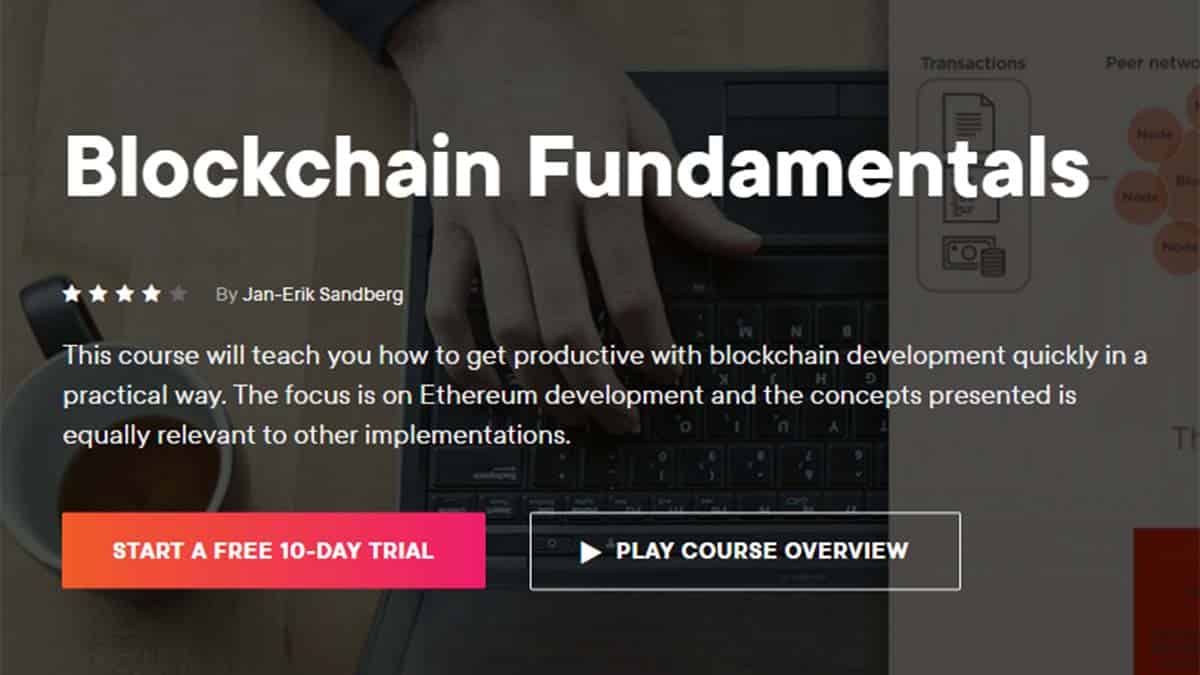
- Beginner-friendly syllabus
- Engaging course instructor
Cons
- Basic content not suitable for intermediate learners
Pluralsight’s “Blockchain Fundamentals” is best suited for those students who have no prior experience with programming or blockchain. While a basic understanding of computer science will give you an edge, it’s not considered a requirement for taking this course.
In the 2-hour-19-minute syllabus, you’ll learn all the usual topics such as the basics of blockchain and its usages, the fundamentals of smart contracts and Ethereum, and how to start developing blockchain applications. The course is led by Jan-Erik Sandberg, a Norwegian agile author, and an experienced developer.
However, keep in mind that the lessons barely cover two hours, so don’t go into the course expecting to get a thorough overview of all important blockchain topics. For that purpose, it’d make more sense for you to select a course that lengthier, such as our #1 and #2 picks from Udacity and Coursera.
This course is an excellent crash course into blockchain development, and it’s best suited for those who are new to the field. While short, it provides a good overview of the very basics. Just don’t go into it expecting to become a fully capable blockchain professional by graduation.
Advance Your Skills in the Blockchain (LinkedIn Learning)
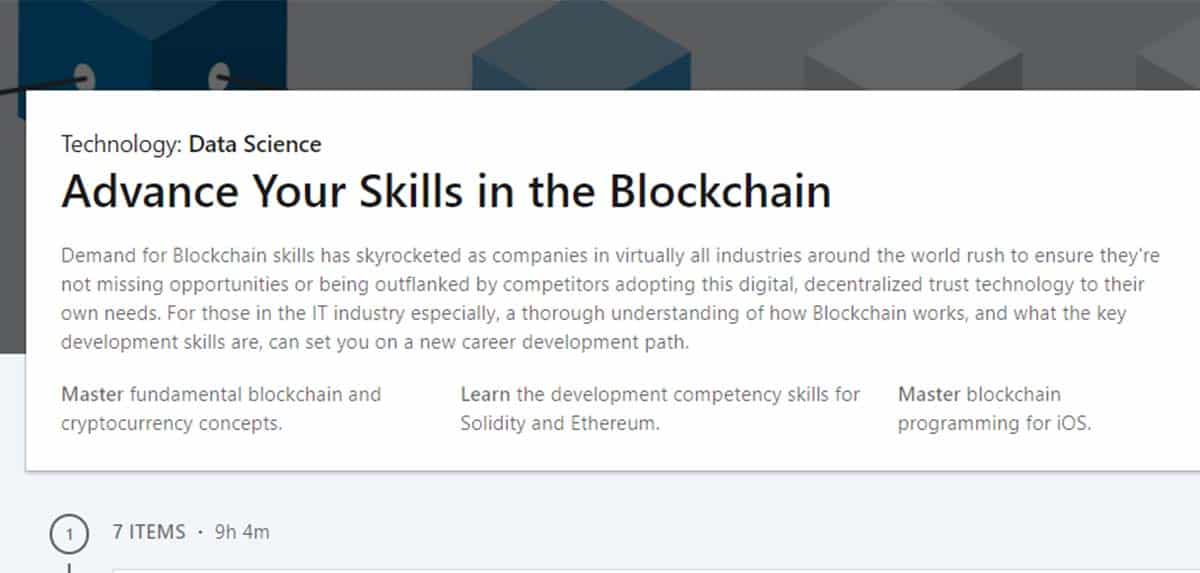
- Covers all major blockchain topics
- Great lineup of expert instructors
Cons
- Lessons are in need of updating
“Advance Your Skills in the Blockchain” on LinkedIn Learning, previously known as Lynda, is a course that’s led by an impressive team of instructors. The blockchain experts that teach this course include
- Jonathan Reichental, an award-winning thought leader.
- Drew Falkman, an expert on blockchain and Fintech.
- Emmanuel Henri, a seasoned full-stack developer.
- Mohammad Azam, an expert in iOS development.
With such an impressive lineup of teachers, it’s no wonder that this is one of the best-rated blockchain courses on LinkedIn Learning. Within nine hours of learning content, the class covers all the usual topics, together with some rather unique lessons such as using Swift to develop blockchain applications in iOS.
While the syllabus is excellent, we felt that it could use a round of updates as the field of blockchain is a quickly evolving one. Many of the lessons are from years back, and by updating the materials for 2021 and beyond, “Advance Your Skills in the Blockchain” on LinkedIn Learning could easily be a top contender in this review of the best blockchain classes. However, as it stands, we consider some of the alternatives to be superior choices.
Ethereum and Solidity: The Complete Developer's Guide (Udemy)

New customer offer! Top courses from $14.99 when you first visit Udemy (expires 31 March 2024).
- Great price-to-content ratio
- Covers lots of topics
Cons
- Great price-to-content ratio
- Covers lots of topics
The final course we’ll be taking a look at in this review of the best blockchain courses is “Ethereum and Solidity: The Complete Developer’s Guide” on Udemy. This course teaches the best practices for a developer who’s looking to use Ethereum and Solidity to build decentralized applications.
The syllabus covers a good amount of topics, and the progression of topics feels natural to beginners. However, the content desperately needs a round of updates as many of the libraries used in the lessons are not supported anymore, and this makes the course less than optimal for those looking to get a solid foundation in the best practices of blockchain development. As an example, the course often uses the v0.4 version of Solidity, while in 2022 the newest version is already v0.8.6.
All in all, it’s a solid course, but it could certainly use some updating, and that is the main reason why we did not place it higher in this review.
With that, our review of the best blockchain courses is concluded, and we hope you found this article helpful.
